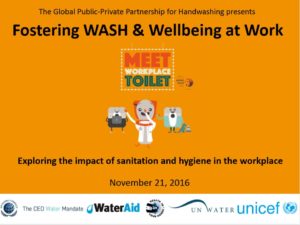Webinar Summary: Fostering WASH & Wellbeing in the Workplace
Published: November 19, 2016 / Published by Global Handwashing Partnership, UNICEF, UN Water, CEO Water Mandate & WaterAid

This webinar summary highlights a discussion and recommendations for improving workplace sanitation and hygiene for employee wellness.
According to the U.N. Joint Monitoring Programme, 2.4 billion people globally do not have access to a toilet, and of them, nearly 1 billion people defecate in the open. The Sustainable Development Goal 6 Target 2 mandates that access to water, sanitation, and hygiene (WASH) be available to all people, at all times, everywhere. Yet, the role of businesses is often overlooked in creating access to safe sanitation and hygiene facilities in the workplace. Failing to meet the WASH needs of workers and adhere to sanitary workplace conditions can have serious financial implications. For instance, global economic loss due to poor WASH is estimated to be $260 billion annually. Investing in toilets provides numerous benefits that far outweigh the costs, and access in the workplace can help keep employees in good health, which in turn strengthens productivity, revenue, and ultimately economies.
In this webinar, UNICEF, UN-Water, CEO Water Mandate, and WaterAid shine a spotlight on the importance of sanitation and hygiene in the workplace for employee health and wellbeing. Presenters explore how to translate learning into action, catalyze progress going forward to improve workplace sanitation and hygiene, and consider how the private sector can scale access to WASH for workers, in the communities where they operate, and across supply chains.
UNICEF Senior WASH Advisor, Cindy Kushner, discussed WASH4Work—a new global initiative that works to improve workplace sanitation and hygiene. WASH4Work specifically explores different ways that business operations can have an impact on WASH. By bringing together a range of actors whose objective is to mobilize action, WASH4Work addresses WASH challenges in the workplace and advocates for the importance of improved WASH from a private sector perspective. WASH service delivery is not solely the responsibility of civil society, NGOs, and governments. A coordinated effort should aim to engage the private sector to foster success and better meet the needs and demands of workers and consumers.
Learn more about the WASH4Work initiative and its global efforts here.
UN-Water Communications Manager, Daniella Bostrom, explained that there is a strong link between sanitation and livelihoods. When employees lack a household toilet and only have unimproved sanitation facilities at work, they often defecate in the open and are less likely to wash their hands after relieving themselves. As a result, the likelihood of disease spread and absenteeism increases. According to UN-Water, 38 workers die from diseases caused by a lack of sanitation every hour. Access to toilets and handwashing stations are essential. Sanitation is also a business opportunity, as the global demand for sanitation and water services equates to $50 billion year. As such, UN-Water used World Toilet Day 2016 as a platform to encourage businesses and stakeholders to invest in toilets in the workplace in order to promote worker health and wellbeing, and incentivize service providers to fulfill people’s basic rights and create long-term jobs.
Learn more about World Toilet Day here and UN-Water’s approach for supporting demand-oriented policies here.
CEO Water Mandate Senior Advisor, Mai-Lan Ha, and WaterAid Innovation & Strategic Engagement Team Leader, Isabelle Herszenhorn, examined how corporations can scale access to WASH for employees and across supply chains. Collaboration with the private sector better mobilizes businesses to take action to address WASH challenges. Businesses can play a critical role in scaling access to WASH by assessing WASH impact areas; ensuring that all employees have access to improved WASH facilities; improving water efficiency, managing pollutants, and treating wastewater as a part of a broader stewardship framework; and collaborating with governments to ensure WASH supplies reach communities. However, businesses oftentimes lack the range tools, case studies, and approaches necessary to make this happen. At the same time, incorporating WASH into supply chains can be challenging given differences in local water governance structures, limited availability of resources, and insufficient infrastructure. As such, the burden of tackling these constraints can be reduced through integration and collaboration with other sectors, engaging in industry-led platforms, and adopting guidance strategies for transition from compliance to capacity-building.
Read CEO Water Mandate’s Scaling Corporate Action on WASH in Supply Chains White Paper here.
The private sector has a lot of capacity for good and the know-how to reach and influence a wide range of audiences. By working together with governments, civil society, and NGOs, businesses can help fill gaps that these stakeholders are unable to bridge by utilizing their expertise to improve and expand coverage. At the most basic level, WASH access should be part of all working conditions for every company, and access to WASH services is essential for workers, no matter the industry or location.
Learn more about key takeaways from these programs by watching the webinar here. Presentations can be downloaded here.
- Resource Attachments:
- https://globalhandwashing.org/wp-content/uploads/2017/12/PPPHW-presentation-Fostering-WASH-Wellbeing-at-Work-FINAL.pdf (pdf)
TAGS: Event RecordingBriefing Paper IntegrationHandwashing and SanitationAdvocacy & PolicyHygiene in the Workplace ImplementersPolicy Makers English 2017